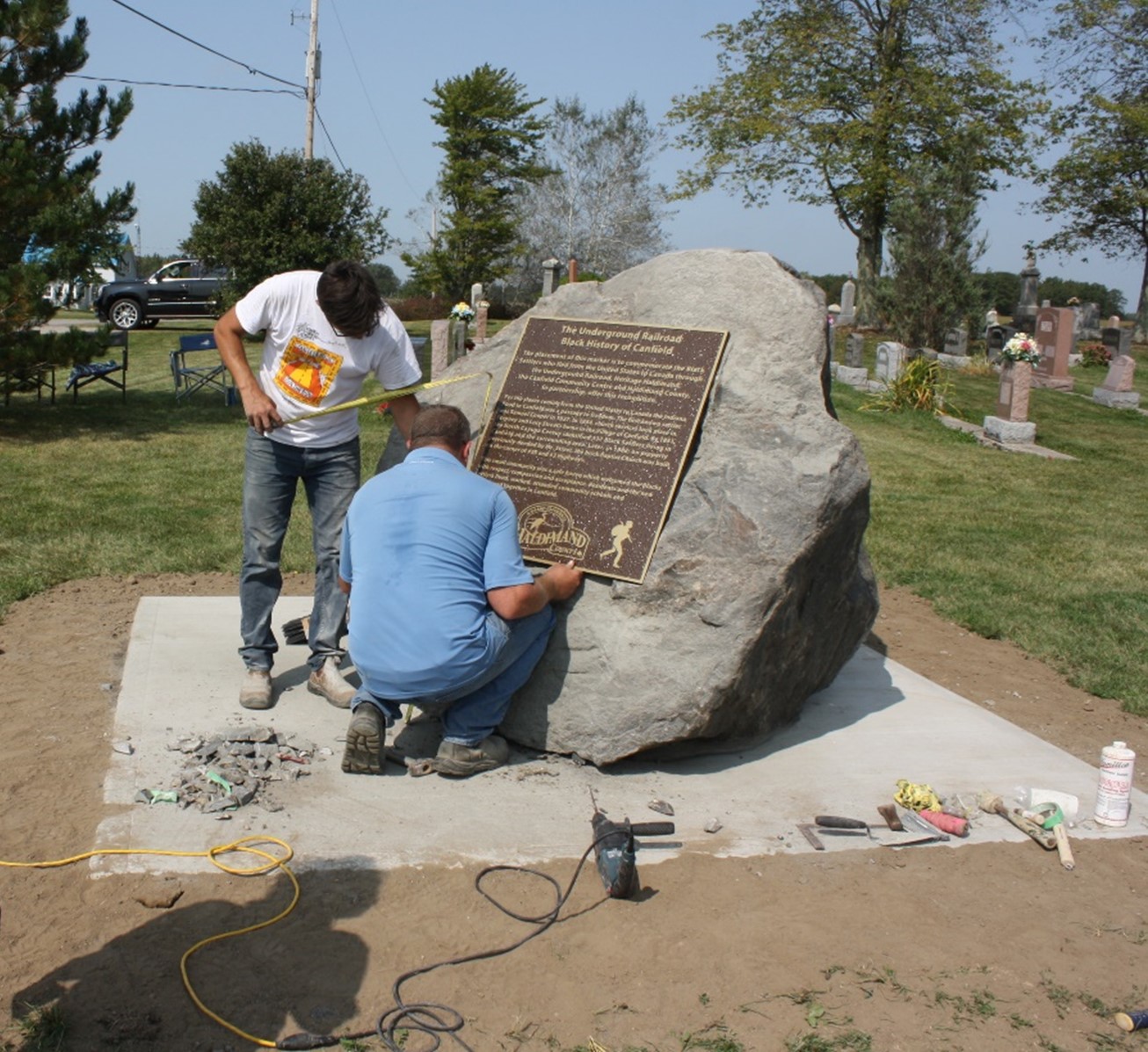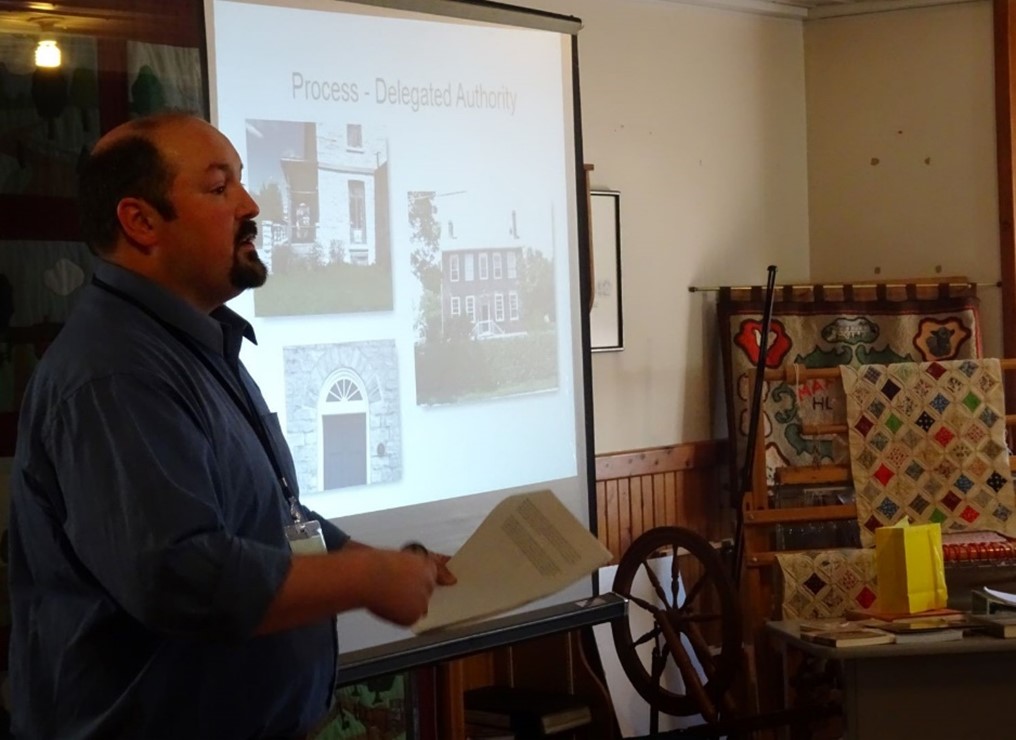3. Setting up an effective municipal heritage committee
Where does a committee begin? There are a number of steps involved in setting the stage for an effective committee.
3.1. Step 1: Establishing the terms of reference
It is the responsibility of council and community members with an interest in heritage conservation to formulate the terms of reference to establish an MHC for approval by council.
A clear, well-defined mandate will go a long way towards maintaining a harmonious and productive relationship. Municipalities are best served when there is complete understanding of the roles and responsibilities of the committee and its members and their duties to the municipal council. Sample terms of reference are provided at the end of this section.
A common practice is to require that specific terms of reference for the committee be stated in the bylaw establishing the MHC.
Clear, well-defined terms of reference should include:
- an unambiguous statement of purpose for the committee: mission statement
- the mandate of the committee: its goals and objectives
- the time frame: when the committee will start, how frequently it will meet, how much time committee work will take
- the resources required: staff, budget, equipment
- the powers of the committee: its authority and parameters for activities such as the hiring of individuals for specific projects, social media use, co-ordinating events and so on
- accountability of the committee to council: to whom, reporting lines, in what form–reports, studies, minutes
- connections of the committee to important activities: such as downtown revitalization committees, municipal cultural planning initiatives, Doors Open events, Heritage Week celebrations and more
- size and potential membership of the committee: each council should carefully consider the size of its municipal heritage committee. Although the Ontario Heritage Act sets a minimum of 5 members for municipal heritage committees, many communities have found that a larger membership serves them better since the workload can be more evenly spread out. Based on the size of the municipality, its reporting structure and the extent of its heritage programs, each council must determine the qualifications and the size of membership that best meets the community’s needs. A municipal heritage committee will often include roles such as chair, co-chair, treasurer, and secretary
- recruitment and membership vacancies: terms of service for MHC members tend to vary. The terms of reference for the MHC should state how long a person serves on the committee and for how many terms they may be reappointed. A fixed term is recommended. Many MHCs limit the number of terms a member can serve to encourage renewal. In order not to lose the expertise and experience of former committee members, some MHCs have set up a category of non-voting associate members. These non-voting members are consulted on issues and undertake special projects
- communication process: including staff and others who should know about the committee and its work, how should information be communicated
- evaluation format: how to measure the effectiveness of your municipal heritage committee
Many municipalities also have procedure bylaws for their standing committees governing appointments to the committee, procedures, duties and rules such as conflict of interest protocols. MHC members should obtain a copy of the municipality’s procedural bylaw from the clerk for reference.
See the following links for examples of MHC terms of reference:
- City of London
- Town of Gravenhurst
- Town of Ajax
- City of Kawartha Lakes
- Town of Oakville
- City of Timmins — bylaw establishing MHC and stating terms of reference
3.2. Step 2: Building a strong membership for your municipal heritage committee

3.2.1. A membership as diverse as your heritage
One of the roles of MHCs is to broadly engage citizens in protecting our heritage. Committees should endeavour to attract representatives with diverse demographics — age, culture, geography (i.e., urban and rural), to help recognize, protect and promote all aspects of a community’s heritage. Does your municipality have a diversity and inclusion plan or strategy? Perhaps a diversity and inclusion committee? Becoming familiar with municipal initiatives around diversity and inclusion may provide your MHC with some best practices that can lead to a stronger committee.
3.2.2. Developing your committee’s capacities
Successful MHCs consist of active community members with a demonstrated interest in heritage conservation and an ability to work together to advise and support council on matters relating to heritage conservation.
3.2.3. Build on expertise
Since heritage conservation issues are complex, look for specific skills, not solely individuals whose names may be recognized within the municipality or among those most active in heritage activities. MHC recommendations supported by reliable technical and professional advice give councils the confidence to make appropriate and sound decisions. To provide council with this expertise, an MHC should possess a wide range of skills and knowledge, including:
- an understanding of heritage conservation approaches (for example, buildings, structures and landscapes)
- a knowledge of historical research (for example, analysis and interpretations)
- trades-work (for example, stonemasonry or heritage carpentry)
- expertise in architectural history including local vernacular architecture (for example, farm buildings)
- knowledge of land-use planning policies and processes
- understanding of municipal procedures and legislations
- effective marketing strategies and approaches
- understanding of legal issues
MHC membership could also draw from local institutions and organizations already playing a role in heritage conservation including:
- community museums
- historical societies and associations
- archives
- libraries
- Doors Open Committees
- Business Improvement Associations (BIA), Chambers of Commerce
- cultural tourism and destination marketing
MHC members do not need to be experts. The most important qualification is a keen interest in heritage! Creating an MHC with a full range of skills is not always possible. Often municipalities will support MHC members who wish to develop their skills through workshops or other training.
3.2.3.1. Declaring conflicts of interest
The Municipal Conflict of Interest Act applies to members of municipal heritage committees. The application of that act is beyond the scope of this guide. Information on what situations are a conflict of interest under the Municipal Conflict of Interest Act and what steps a member must take to avoid a conflict of interest are usually available from the municipal clerk or the municipal solicitor.
3.3. Step 3: Identifying municipal staff and resources to support your committee’s activities
The role and scope of involvement of municipal staff with the MHC varies from municipality to municipality since staff roles are often dependent on municipal resources.
MHCs interact and deal with a number of different municipal departments or staff, including the clerk’s office, planning, building, legal, recreation and parks, bylaw enforcement, property standards and so on.
Often, councils appoint 1 or more municipal staff persons to support the MHC. The value in having a staff person involved is consistency in guiding the MHC through municipal procedures. The appointed staff may also be able to answer routine enquiries from the public and forward literature on behalf of the MHC when the volunteer committee members are not available.
In larger municipalities, the MHC may be assigned to a particular department such as Planning or the Clerk’s Office. The department should identify which of its resources the MHC should reasonably expect (for example, a staff liaison, photocopying, meeting space, translation services, refreshments, letterhead, records management, typing, etc.). Council may also find it useful to assign the clerk, municipal solicitor, building inspector or planner (by virtue of their position) as non-voting members of the committee.
3.3.1. Establishing a municipal heritage committee budget
Municipal council is responsible for providing its MHC with a budget. Budgets vary widely across the province.
Once a year as part of the larger annual budget process the MHC should submit an operating budget to the finance committee or directly to municipal council outlining its activities, expenses and revenues. The budget process also acts as a strategic planning exercise by encouraging the committee to set its program objectives and goals for the year. The terms of reference for the MHC should address an operating budget for the committee reflective of the committee responsibilities identified in the terms of reference.
The list below identifies some of the costs associated with the operation of an MHC that may need specific funding:
- publication costs (for example, for pamphlets promoting designation, inventories, heritage reports and studies)
- advertising costs (for upcoming events and for publishing notices of intention to designate in the local papers)
- program costs (for example, for inventories, for plaques or markers, or for establishing programs such as 'Doors Open')
- communication costs (for example, for telephone, fax and internet expenses)
- office supplies
- mileage for transportation needs (for example, for inventories, assessing properties for designation and traveling to conferences)
- training and seminars (for example, for learning about heritage conservation techniques or writing statements of cultural heritage value or interest)
- harmonized sales tax (HST)
- miscellaneous expenses
A special funding budget could include the following items:
- a fund to allow for grants supporting the restoration of designated properties
- loans for helping property owners restore designated heritage attributes
- consultants' costs for special studies (for example, Heritage Conservation District studies)
In addition to council support for the resources needed by the MHC, the committee may consider seeking support from private or service sectors for special projects. This can take the form of donations of services, supplies and project-specific funding. When seeking financial support outside municipal council, the MHC should follow local municipal guidelines/policies.
